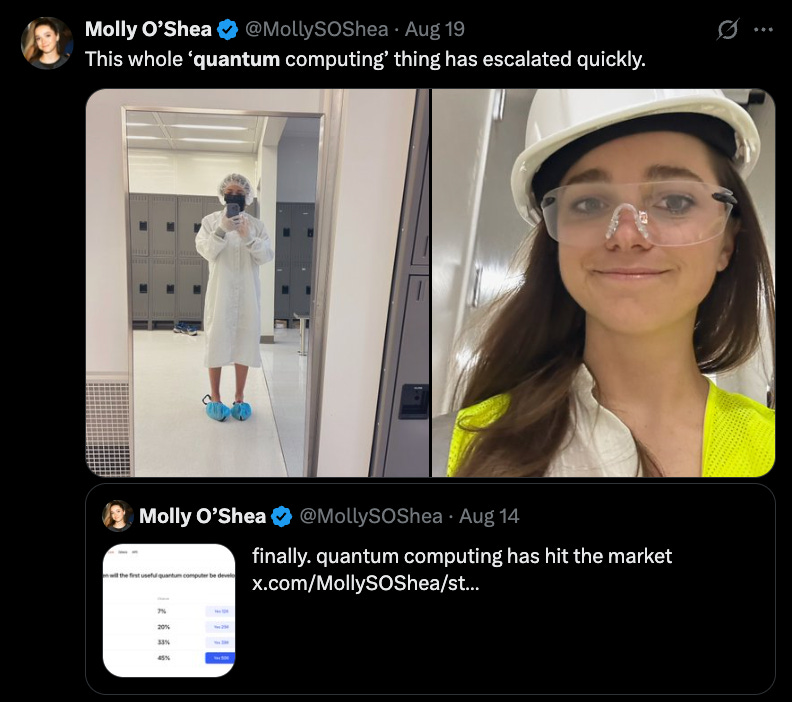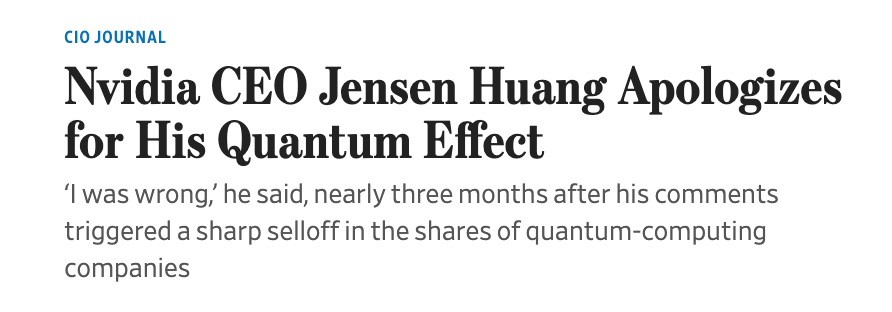BREAKING: PsiQuantum’s $1B Series E, Nvidia, & the Race to 1 Million Qubits
$2B in total funding, $7B valuation
“N of 1” Million Qubits
Pete Shadbolt, Chief Scientific Officer & Co-Founder of PsiQuantum, joins Sourcery to announce the company’s landmark $1 billion Series E, bringing total funding to nearly $2 billion, making PsiQuantum the most well-funded quantum computing company in the world.
→ Listen on X, Spotify, YouTube, Apple
Led by investors BlackRock, Temasek, and Baillie Gifford, this fundraising values the company at $7 billion and welcomes new investors, including entities administered by Macquarie Capital, Ribbit Capital, NVentures (NVIDIA’s venture capital arm), Adage Capital Management, Qatar Investment Authority (QIA), Type One Ventures, Counterpoint Global (Morgan Stanley), 1789 Capital, and S Ventures (SentinelOne).
The round also included participation from existing investors including Blackbird, Third Point Ventures, and T. Rowe Price.
PsiQuantum is doubling down on its radical bet: one-shot 1 million qubits to unlock “useful” quantum computing.
In our very deep and fun conversation, Shadbolt explains why PsiQuantum rejected incrementalism, how the partnership with Nvidia & Jensen Huang strengthens the roadmap, and why quantum is positioned as the next wave of compute alongside AI and semiconductors.
From photonic chip breakthroughs to government partnerships in Australia and Illinois, this is a rare inside look at the company leading the race to build the world’s first fault-tolerant quantum computers.
Use of Funds
Break ground and begin building first utility-scale quantum computers in Brisbane and Chicago.
Continue to scale up the development of advanced materials (BTO - Optical switch material), assembly of sub-systems, and deploy our largest test systems yet.
Develop and push the performance of Omega (silicon photonics platform).
5 Key Takeaways
PsiQuantum closed a $1B Series E, bringing total funding to nearly $2B
Investors include BlackRock, Temasek, Baillie Gifford, Macquarie, Nvidia (NVentures), Ribbit Capital, QIA,1789 Capital & more
PsiQuantum is committed to an “N of 1 Million Qubits” strategy
Strategic partners: Jensen Huang & Nvidia, collaborating on GPU-QPU integration, algorithms, & photonics
PsiQuantum’s valuation hit $7B, making it the most well-funded quantum company in the world
DEEP DIVE BELOW
Brought to you by:
Brex—The intelligent finance platform: cards, expenses, travel, bill pay, banking—wrapped into a high-performance stack. Built for scale. Trusted by teams that move fast.
As a Sourcery subscriber you get: 75,000 points after spending $3,000 on Brex card(s), white-glove onboarding, $5,000 in AWS credits, $2,500 in OpenAI credits, & access to $180k+ in SaaS discounts. On top of $500 toward Brex travel, $300 in cashback, plus exclusive perks (like billboards..) visit → brex.com/sourcery
Turing—Turing delivers top-tier talent, data, and tools to help AI labs improve model performance, and enable enterprises to turn those models into powerful, production-ready systems. Visit: turing.com/sourcery
Kalshi—The largest prediction market & the only legal platform in the US where people can trade directly on the outcomes of future events (sports, politics, weather, AI, etc).
Timestamps
(00:00:00) Intro and Recent Funding
(00:02:29) Building PsiQuantum: From UK to Silicon Valley
(00:03:55) Investment Strategy and Deep Tech Focus
(00:05:35) PsiQuantum's Differentiation: Going Big from Day One
(00:07:03) Rejecting Incrementalism for Large-Scale Vision
(00:09:13) The Rocket Engine Analogy
(00:10:59) Timeline Debates and NVIDIA Partnership
(00:15:36) Global Manufacturing and Facilities
(00:20:21) Path to Becoming a Trillion Dollar Company
(00:23:32) Revenue Model and Commercialization Strategy
(00:27:53) Working with Global Foundries
(00:31:27) Quantum Computing's Role in Semiconductor Industry
(00:38:28) Public Trust and Government Validation
(00:45:49) The Reality of Quantum Computing Valuations
(00:53:12) Zero to One Technology Approach
(01:00:19) Global Facilities and Infrastructure
(01:09:03) Reindustrialization and Strategic Importance
(01:34:02) Personal Journey and Vision
(01:44:23) Timeline for Useful Quantum Computing
(01:53:54) Looking Ahead: Next Steps and Future Vision
PsiQuantum’s $1 Billion Bet on the Future of Computing
$1B Raise, $2B Total Funding, $7 Valuation
In September 2025, PsiQuantum announced a historic $1 billion Series E funding round, bringing its total raised to nearly $2 billion in private capital. The round was led by BlackRock, Temasek, and Baillie Gifford, with new participation from Macquarie Capital, Ribbit Capital, NVentures (NVIDIA’s venture capital arm), Adage Capital Management, Qatar Investment Authority (QIA), Type One Ventures, Counterpoint Global (Morgan Stanley), 1789 Capital, and S Ventures (SentinelOne). As well as participation from existing investors including Blackbird, Third Point Ventures, and T. Rowe Price.
The valuation now stands at $7 billion, making PsiQuantum the most well-funded quantum computing company in the world.
For Pete Shadbolt, PsiQuantum’s Chief Scientific Officer and co-founder, this raise was the culmination of a decade-long journey from university research into industrial-scale engineering. “I came to Silicon Valley about 10 years ago now… with the idea that we could build what is widely viewed as one of the most consequential technologies humans have ever come up with,” he said. “It’s astonishing to me that we’re still here, still kicking, and that we’re so incredibly well resourced.”
The funding will fuel construction of PsiQuantum’s first large-scale facilities in Brisbane and Chicago, accelerate chip manufacturing at GlobalFoundries, and deploy the company’s largest test systems to date. For Shadbolt, the raise reflects growing recognition that useful quantum computing requires a bold, all-in approach rather than incremental demos.
Funding History
Playground Global & Redpoint led the Series A in 2016
Founders Fund led the Series B in 2017
Atomico and M12 led the Series C in 2019
BlackRock led the Series D in 2021.
Rejecting Incrementalism: “N of 1 Million Qubits”
Most competitors in the field showcase small, experimental quantum processors with dozens or hundreds of qubits. PsiQuantum has gone in the opposite direction, refusing to release demo systems in favor of investing directly in the technology, engineering, and infrastructure required for a million-qubit machine.
“We just went fully, a hundred percent committed to realizing a very large machine,” Shadbolt explained. “Every investor that we’ve spoken to, every government that we’ve spoken to, the deal has basically been that if you give us money, we will spend that money exclusively on the technologies that are needed to get to a very, very large system that is actually commercially useful.”
That contrarian bet, once considered overly risky, now looks prescient. PsiQuantum’s “N of 1 million qubits” philosophy is resonating as the industry increasingly accepts that small machines can’t solve commercially valuable problems. “Instead of incrementalism, we’re going straight to being an N of 1 million qubits company,” Shadbolt told Sourcery.
Stats
80% supply chain in the US. 500+ suppliers, including GlobalFoundries.
Now 500+ people, doubled in the last 18 months
All four founders remain at the company and in leadership positions.
Leveraging the U.S. Semiconductor Industry to Scale
What sets PsiQuantum apart from other quantum companies is its decision to bet everything on scalability from day one. Rather than trying to squeeze more performance out of laboratory prototypes, PsiQuantum committed to building a system that could ride the same industrial infrastructure that makes billions of chips for smartphones and servers each year. That choice led the company to photonics.
“We just went fully, a hundred percent committed to realizing a very large machine,” Shadbolt explained. “The only reason that we could afford to make that really extreme bet… is that our technology fits into the fabs and the contract manufacturers who are building millions of devices for the semiconductor industry every year.”
PsiQuantum has now spent more than six years partnering with GlobalFoundries, one of the largest semiconductor manufacturers in the United States. Their quantum photonic chips are built on GF’s 300mm commercial line in Upstate New York, and tested and assembled in PsiQuantum’s facilities in California. In 2025, the company unveiled the Omega chipset, a silicon photonic platform that integrates high-performance optical switches and photon detectors into a manufacturable architecture. Omega represents a turning point: PsiQuantum can now produce quantum chips with the same precision, reliability, and yield as the chips in cellphones and laptops. This is no longer a science experiment — it is a pathway to scaling from hundreds of qubits to millions.
In April 2024, PsiQuantum and Australian Prime Minister Anthony Albanese announced a $940M (AUD) partnership with the Australian Federal and Queensland State governments for PsiQuantum to build its first Gen-1 utility-scale quantum computer in Brisbane, with the company establishing its Asia-Pacific HQ in Brisbane. In July 2024, PsiQuantum announced that it would build its first U.S.-based Gen-1 system in Chicago, anchoring the Illinois Quantum & Microelectronics Park. In February 2025, following extensive technical analysis with an independent verification and validation team, DARPA selected PsiQuantum for the final stage of the Quantum Benchmarking Initiative (QBI).
PsiQuantum recently began moving several of the company’s Bay Area teams into a new 127,000+ square-foot Test & Assembly facility in California. This facility gives the PsiQuantum team the space, power, and controlled environment to enable mass production of sub-assemblies and raw materials, including 300mm BTO wafers. PsiQuantum will build its largest intermediate test systems at this new facility in California and at the company’s future site at the Illinois Quantum; Microelectronics Park (IQMP) in Chicago, where the company will break ground later this year. PsiQuantum is a privately held company owned by its investors and employees, with a global team of more than 500 people.
Nvidia’s Strategic Entry & Jensen Huang’s Pivot
Nvidia, the four-trillion-dollar company powering the AI boom, has now placed a high-conviction bet on PsiQuantum through NVentures and with direct collaboration. Jensen Huang & Nvidia are now working with PsiQuantum on GPU-QPU integration, algorithms, & photonics. Shadbolt noted that Jensen had overlooked the longdated on quantum, shifting from skepticism to signing strategic involvement.
“Jensen said you need a million qubits,” Shadbolt recalled. “He starts by saying that this is, of course, left out of the quotes in the media… but it was pretty encouraging to see. And I was very grateful to have the opportunity to put the counterpoint to him at GTC earlier this year.”
Today, Nvidia and PsiQuantum are collaborating on GPU-QPU integration, quantum algorithms, and are exploring PsiQuantum’s silicon photonics . “We are actually working with Nvidia on a whole bunch of different tracks,” Shadbolt said. “They’ve obviously decided to take a leadership position in this space. They’re deadly serious about it.”
“I do wonder whether quantum computing is simply poorly positioned,” Huang said, “because it was described as a quantum computer instead of a quantum instrument.”
He added, “there’s a common sense about what a computer is. It has to have memory, it has to have networks, it has to have storage, it should be able to read and write. There’s a programming model associated with computers. But I wonder if it’s just a wrong mental model.” Jensen Huang
The bet on PsiQuantum is that it can deliver Nvidia-like results in the new era of compute. Nvidia’s breakout success in AI gave the company not only a second wind but an entirely new identity. Transforming from a gaming GPU vendor into the backbone of global AI infrastructure. For Pete Shadbolt, that reinvention is a powerful model. He draws inspiration from Nvidia’s ability to evolve and ultimately dominate the world of scientific computing.
“They used to sell, and this isn’t meant to be derogatory, it’s just meant to make a point.. they used to be a toy company,” he said. “They used to sell gaming hardware, and then they transitioned to selling H100s by the bucket load. And now they are a supercomputer company.”
“It’s wild to think that the world’s biggest company would be a scientific computing company that sells supercomputers as their main product,” he noted. “That trajectory is inspirational to me when people say quantum computing is 10 years away or science fiction.”
WTF is BTO? Why is PsiQ Betting on Barium Titanate?
When PsiQuantum closed its Series D, there was still one critical piece missing from the architecture: the optical switch. The only way forward was to develop an entirely new material at a scale nobody had ever attempted. Rather than wait for the industry, PsiQuantum made the risky, expensive bet to build it themselves.
The company invested in two Molecular Beam Epitaxy (MBE) tools, the only ones of their kind in the world producing 300mm wafers of barium titanate (BTO). BTO is the highest-performing electro-optic material known to science, and PsiQuantum now manufactures it in Silicon Valley before shipping wafers to GlobalFoundries in New York for integration into its Omega chipset.
The result is what PsiQuantum claims to be the world’s most advanced optical switch, enabling data movement and control at the scale needed for a million-qubit system. Shadbolt noted that this breakthrough has caught the eye of the broader compute ecosystem: “We make some of the best photonics in the world, and that’s pretty relevant for networking and AI supercomputers.” Interest is now coming not only from quantum, but also from AI and HPC companies seeking to push the limits of their own systems.
How Will PsiQuantum Become a Trillion-Dollar Company?
Asked directly how PsiQuantum could one day become a trillion-dollar company, Shadbolt pointed to the central role of physics, chemistry, and math in the global economy.
“Just look at the most consequential, durably valuable, strategically important, geopolitically significant companies of our age. TSMC, ASML, SpaceX, Nvidia, OpenAI. These companies are valuable almost by definition because they’re doing something so technically difficult that nobody else can do it.”
PsiQuantum’s bet is that a million-qubit system will unlock new mastery over materials, molecules, and reactions that underpin everything from semiconductors to fertilizers to pharmaceuticals. “How can we become a trillion-dollar company?” Shadbolt asked. “By being the only company on the planet with a categorically new level of mastery over chemistry, physics, and math.”
Quantum as the Third Wave of Compute
In the Sourcery interview, Shadbolt positioned quantum computing as the next inflection point in the history of compute—following semiconductors and AI. “To my eyes, it really does look like humans are on this monotonic trajectory where they’re reaching for more and more extreme technologies,” he said. “Quantum computing is obviously an example of that.”
He also emphasized how quantum complements AI, rather than competes with it. “One of the things that we’re most excited about is to use the quantum computer to produce training data that we can then feed to conventional machine learning systems,” he explained. “Through that kind of mechanism, we can produce a wholesale upgrade of our mastery of chemistry and material space.”
This framing places PsiQuantum not as a rival to AI supercomputing, but as its enabler. Helping generate data in domains where classical supercomputers fall short.
Defeating Skepticism.. So. What’s Next?
Skepticism remains natural for a company raising billions without a product in market. Shadbolt pointed to independent scrutiny from DARPA under their utility-scale quantum computing program, which subjected PsiQuantum to a years-long red-team evaluation.
“DARPA started from the assumption that quantum computing doesn’t work,” he said. “They took 50 scientists and engineers and told them essentially, your job is to kill quantum computing companies… and we still have not been killed.
We have just graduated to the final phase of their program.”
For Shadbolt, that process underscored why PsiQuantum’s contrarian approach is gaining credibility. “We are obviously a deep tech company,” he said. “It’s bloody difficult, but it’s definitely possible. That’s why I’ve spent the last 10 years in pursuit of it. And will continue to do so.”
The company is now moving into a new 130,000 sqft facility, where they will build large test systems and scale-up the manufacturing of BTO. Later this year, the company expects to break ground on its sites in Brisbane and Chicago.
Full computing ahead.
Extra Resources
Terms to Know:
(Physical) Qubits – The fundamental units of quantum information, analogous to bits in conventional computing, but capable of existing in superposition states.
Logical qubits – Error-corrected qubits built from many physical qubits. Logical qubits provide the stable, reliable units of computation needed for fault-tolerant quantum computing.
Omega – PsiQuantum’s silicon photonic chipset that integrates all of the components needed for utility-scale quantum computing, onto one manufacturable platform.
Barium Titanate (BTO) – The strongest electro-optic material known to science and the material that PsiQuantum develops in-house for its high-performance optical switch.
Molecular Beam Epitaxy (MBE) – A highly precise thin-film deposition technique used to grow crystalline layers of materials at the atomic level. PsiQuantum uses MBE to engineer advanced materials like Barium Titanate (BTO).
Fault-tolerant – A property of a quantum computer that allows it to operate reliably even when individual qubits and gates are imperfect, achieved through error correction and redundancy.
Error-correction – The system of encoding logical qubits into many physical qubits in order to detect and correct errors, ensuring the stability required for fault-tolerant quantum computing.
Psi function (ψ) – Also known as the wave function, it is the central mathematical description of a quantum system, capturing the probabilities of all possible measurement outcomes.
Silicon photonics – A platform that integrates optical components onto silicon chips, enabling scalable, high-performance control of photons for quantum computing and other computing and communications industries.
GlobalFoundries – A leading US semiconductor foundry in upstate New York and PsiQuantum’s partner for developing 300mm wafer scale silicon photonics fabrication.
Cryoplant – An industrial-scale cryogenic cooling facility designed to keep quantum hardware operating at extremely low temperatures necessary for photon detectors.
SLAC National Accelerator Laboratory – A U.S. Department of Energy lab in Menlo Park, CA operated by Stanford University, advancing research in particle physics, materials, energy, and quantum technologies.
Brought to you by Brex:
Brex is the intelligent finance platform: cards, expenses, travel, bill pay, banking—wrapped into a high-performance stack. Built for scale. Trusted by teams that move fast.
Spend smarter. Move faster. Sourcery subscribers get: 75,000 points after spending $3,000 on Brex card(s). Plus, white-glove onboarding, $5,000 in AWS credits, $2,500 in OpenAI credits, and access to $180k+ in SaaS discounts. On top of $500 toward Brex travel, $300 in cashback, plus exclusive perks (like billboards..) visit → brex.com/sourcery













